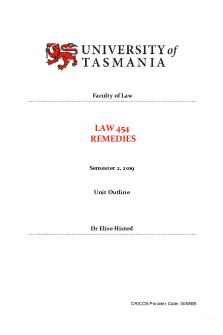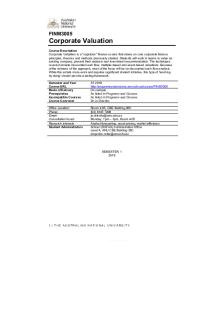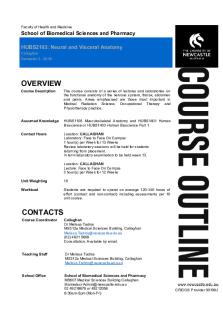CVE30004 Unit Outline Sem 2 2018 R0 PDF

| Title | CVE30004 Unit Outline Sem 2 2018 R0 |
|---|---|
| Course | Cost Engineering |
| Institution | Swinburne University of Technology |
| Pages | 15 |
| File Size | 507.9 KB |
| File Type | |
| Total Downloads | 66 |
| Total Views | 141 |
Summary
Download CVE30004 Unit Outline Sem 2 2018 R0 PDF
Description
Faculty of Science Engineering and Technology
Unit Outline CVE30004 Cost Engineering Semester 2, 2018
Please read this Unit Outline carefully. It includes:
PART A
Unit summary
PART B
Your Unit in more detail
PART C
Further information
Issued: 23 July 2018
PART A:
Unit Summary
Unit Code(s)
CVE30004
Unit Title
Cost Engineering
Duration
One Semester 48 hours
Total Scheduled* Contact Hours
Face to Face ☐ Blended ☐ Fully Online
Requisites: Pre-requisites
175 credit points that must be completed before undertaking this unit
Co-requisites
Nil
Concurrent prerequisites Anti-requisites
Students are precluded from doing CSM80001 due to overlap of content
Assumed knowledge
Competence in use of Microsoft Word® and Excel®
Credit Points Delivery Locations
12.5 On-campus
☐ Sarawak
☐ Hawthorn Online Assessment Summary
Continuous: 60%
☐ OUA
☐ SOL
☐ Other:……………………….. Post-unit Exam: 40%
Aims This unit of study aims to introduce students to the profession of cost engineering and the principles and professional practices of Total Cost Management and its application to project management of engineered projects. The course covers the key indicators for a general understanding of project costing and project controls. Although the examples given are generally those applicable to infrastructure engineering projects, the techniques and principles also have application in other very different disciplines such as process engineering, manufacturing and IT projects. This course presents an overview of the main challenges and opportunities associated with project execution, risk, economics, estimating, tendering, planning and scheduling for project success. This subject also outlines factors that you need to be familiar with and to understand for you to be a successful and professional project (cost) engineer.
Unit Learning Outcomes Engineers are recognised as reliable professionals that deliver needed services using technology of all sorts. Cost Engineering, entailing control of time and cost, is an essential component of that reliable delivery of services. This course will enable you to recognise competent cost engineering practice and communication.
Students who successfully complete this Unit should be able to:
CVE30004_Unit Outline_Sem 2 2018R0.docx Version: Unit of Study Outline_ V2_2 5_2_18
Page 2 of 15
1. Understand the various stages in the life cycle of a project, from concept through evaluation, “Go/No-Go” decision points, execution (engineering & construction), start up and commissioning, operation & maintenance, to the end of life activities, and be aware of the standard for Life Cycle Costing (AS /NZS 4536-1999). (K1, K6, S1, S4, A3, A7) 2. Recognise the basic project delivery systems used for project execution, the varying contractual and commercial relationships generally associated with each system, and the advantages / disadvantages of each system. (K1, K3, K5, S4) 3. Describe the fundamentals of risk analysis and risk management (AS/NZS ISO 31000 - 2009). (K1, K6, S4) 4. Recognise the fundamental underpinnings of engineering economics, including the time value of money, the impact of escalation and risk, and the various measures used to evaluate potential projects or compare financial alternatives using DCF techniques, and Benefit Cost analysis, cash and investment flows, inflation and escalation, foreign exchange and hedging. (K1, K2, K3, K5, S1, S2) 5. Understand how projects are controlled and reported using communication with the project team and stakeholders, and employing planning, budgeting, change management, earned value and cost analysis, scheduling, and forecasting. (K3, K6, S2, S4, A2, A4, A7) 6. Understand how to estimate project cost and time including: quantity take-off (AS1181); the various types and reliability of estimates; categories of cost and estimate techniques; market risk, escalation and contingency. (K1, K2, K6, S4, S2, A2, A7) 7. Understand the difference between planning and scheduling and prepare bar (Gantt) charts and logic networks for project execution, manually and using software to analyse networks to determine critical paths. (S2, S4) 8. Recognise the legal and practical fundamentals of contract law and, recognise the key commercial terms of commonly used contract forms, particularly AS 2124 and the AS 4000 series, including tendering provisions. (S4, A3) 9. Understand what it means to be a professional in cost engineering including: the competent use of tools; communication; professional development and the organisations that support it; and registration as a cost engineer. (K2, K3, K5, K6, S4, A4, A5, A7)
Key Generic Skills You will be provided with feedback on your progress in attaining the following generic skills: • • • • • • • •
K1 Basic Science: Proficiently applies concepts, theories and techniques of the relevant natural and physical sciences. K2 Maths and IT as Tools: Proficiently uses relevant mathematics and computer and information science concepts as tools. K3 Discipline Specific: Proficiently applies advanced technical knowledge of the specific discipline within that context. K5 Practice Context: Discerns and appreciates the contextual factors affecting professional engineering practice. K6 Professional Practice: Appreciates the principles of professional engineering practice in a sustainable context. S1 Engineering Methods: Applies engineering methods in practical applications. S2 Problem Solving: Systematically uses engineering methods in solving complex problems. S4 Project Management: Systematically uses engineering methods in conducting and managing projects.
CVE30004_Unit Outline_Sem 2 2018R0.docx Version: Unit of Study Outline_ V2_2 5_2_18
Page 3 of 15
• • • • •
A2 Communication: Demonstrates effective communication to professional and wider audiences. A3 Entrepreneurial: Appreciates entrepreneurial approaches to engineering practice. A4 Information Management: Demonstrates seeking, using, assessing and managing information. A5 Professional Self: Demonstrates professionalism. A7 Teamwork: Demonstrates effective team membership and team leadership.
Content • • • • • • • • • • •
Projects & facility life cycles, Project delivery systems & commercial options, Risk Analysis - AS/NZS ISO 31000-2009 Risk management. Project Control of time & cost during project execution and ongoing activities. Introduction to engineering economics, interest / DCF / cash flows / escalation, Measurement of quantities (Australian Standard AS1181), Cost estimation (order of magnitude / preliminary / definitive / detailed), Work planning & the development of crews and production rates, Work scheduling (bar charts / CPM / PERT), Cost Engineering tools Commercial aspects of Standard Conditions of Contract (AS2124 and AS4000 series)
PART B:
Your Unit in more detail
Unit Improvements Feedback provided by previous students through the Student Survey has resulted in improvements that have been made to this unit. Recent improvements include: • Further clarification of assignment questions with more explanation and elaboration of content during tutorials • Transfer to the Canvas learning management system to improve student assessment and access to learning materials
Unit Teaching Staff Name
Role
Room
Phone
Email
Dr. Robert Evans
Unit Convenor
ATC737
9214 8233
[email protected]
Nolan Bear
Lecturer/Tutor
TBA
9214 5319
[email protected]
4:30pm to 5:30pm Wednesday
Tutor
TBA
Thursday Tutorials
[email protected]
2:30pm to 3:30pm Thursday
Tutor
TBA
Friday
[email protected] du.au
2:30pm to 3:30pm
Chris Corcoran Geoff McDonald
Tutorials Emergency
Laurence Pole
TBA
9214 8015
[email protected]
Consultation Times
Friday
As required
Lecturer/Tutor
CVE30004_Unit Outline_Sem 2 2018R0.docx Version: Unit of Study Outline_ V2_2 5_2_18
Page 4 of 15
Note: Students who book a consultation by email or phone will be given priority over any who simply turn up without an appointment.
Learning and Teaching Structure Activity
Total Hours
Hours per Week
Teaching Period Weeks
Lectures
24 hours
2 hours
Weeks 1 to 12
Tutorials/Lab Work
24 hours
2 hour
Weeks 1 to 12
All tutorials in this subject take place in multipurpose laboratories. Note that these laboratories have a limited number of terminals (2 per team) and students should bring their own laptops. Students work individually and in teams on problem analysis and assignment presentations. Each team member is required to demonstrate their contribution to team assignments. The quantum of the individual member’s contribution will be assessed by peer review at the time of group assignment submission. After peer review and, at the discretion of the staff, marks may be deducted for lack of contribution to a team assignment. In a Semester, the average student should normally expect to spend, over the 12-week semester, twelve and a half hours of total time (formal contact time plus independent study time) per week on a 12.5 credit point unit of study, excluding the final exam and study preparation.
Week by Week Schedule This weekly schedule is designed to coincide with the timeframe for student learning required to complete the four assignments that form the assessment work in this subject. Students will be assigned to groups in week 2 and will work in their assigned group for team assignments #2 and #4. (Assignments #1 and #3 are individual assignments). Note: Tutorials and Laboratory Work are not differentiated in this subject and both take place in multipurpose rooms.
CVE30004_Unit Outline_Sem 2 2018R0.docx Version: Unit of Study Outline_ V2_2 5_2_18
Page 5 of 15
Chapter references below refer to the textbook “Cost Engineering for Project Success”.
Week
Week Beginning Monday
1
July 30
2
August 6
Teaching and Learning Activity Lecture: Introduction - Course delivery and assessment, Prereading, Canvas tests, Excel skills Tutorial: Cost Engr. Tools (basic) Excel® spreadsheet skills Lecture: Estimating for Construction, Quantity Calcs. Use of BofQ and Aust. Standard for Measurement.
Student Task or Assessment For assigning to teams: Fill out and submit aptitude test.
Assignment #1 (individual) issued. Prior Readings: Ch 11 Excel, Ch 6 Quantities and Ch 8 Estimates
Tutorial: Sketching, On-line Test #1. measurements and computations of quantities. 3
August 13
Lecture: Estimating for Project Scope. Sources of data when little information available e.g. ATO, Bureau of Statistics data
Prior Readings: Chapter 7 Estimating for Project Scope On-line Quiz #1.
Tutorial: Parametric estimating, Scaling and rules of thumb 4
August 20
Lecture: RISK - Development of Risk Assessment. Use of AS/NZS ISO 31000 - 2009. Tutorial: Team risk exercises. ALARP concepts.
5
August 27
Lecture: Planning the Project – Applying logical concepts to multiple challenges for optimum outcomes.
Assignment #1 submitted, Assignment #2 (team) issued – assign tasks & preparation. Prior Readings: Chapters 3, Risk Assessment. On-line Test #2. Prior Readings: Chapters 9, Planning the Project. On-line Quiz #2 Ch 9 Planning.
Tutorial: Setting up a logical work sequence. 6
September 3
Lecture: Scheduling the Project - Basics of Precedence Diagram Method – Introduction to Microsoft Project®. Tutorial: Application of Microsoft Project® to a construction schedule.
Written submission of Assignment #2 (team). Assignment #3 (individual) issued. Setting up and using Microsoft Project® for scheduling a construction project. Prior Readings: Chapters 10.1 to 10.7, Scheduling the Project. Plus supplementary readings in Canvas. On-line Test #3.
September 10
CVE30004_Unit Outline_Sem 2 2018R0.docx Version: Unit of Study Outline_ V2_2 5_2_18
MID SEMESTER BREAK
Page 6 of 15
Week
Week Beginning Monday
7
September 17
8
9
September 24
October 1
Teaching and Learning Activity
Student Task or Assessment
Lecture: Project Controls - How and Why these are necessary.
Oral presentation of Assignment #2 (team).
Tutorial: Progressing the schedule, Earned Value (EVM)..
Assignment #3 submitted Assignment #4 (team) issued
Tutorial: Assignment #2 oral presentations.
Prior Readings: Chapter 4, Project Controls. On-line Quiz #3.
Lecture: Contracts, use of standard forms of Contract AS2124, AS4000 etc.
Delegate tasks and work on Assignment #4 (team).
Request for Quotation, Form of Tender, Refining the Contract documents, Calling tenders, Analysing tender bids, Selecting the winning bid, Formalising the Contract.
Prior Readings: AS4000 & Chapter 12, Contracts.
Lecture: Cost Engineering Economics - Time value of money.
Prior Readings: Chapter 5, Cost Engineering Economics.
Tutorial: Team exercises: Simple & Compound interest.
On-line Quiz #4.
On-line Test #4.
Time value of money, Net Present Worth and economic evaluations. Contractor's Cash Flow requirement for Assignment #4 10
October 8
Lecture: Project Execution, PDS for different project types.
Assignment #4, written submission
Demonstration Excel data tools.
Prior Readings: Chapter 2, Project Execution.
Tutorial: Excel data Cost Engineering tools, Filters, Pivots and advanced formulae. 11
October 15
Lecture: Project & Facility Lifecycles – Owner and Contractor perspectives. Tutorial: Assignment #4 orals
On-line Test #5. Oral presentation of Assignment #4 (team). Prior Readings: Chapter 1, Project & Facility Lifecycles. On-line Quiz #5.
12
October 22
CVE30004_Unit Outline_Sem 2 2018R0.docx Version: Unit of Study Outline_ V2_2 5_2_18
Recap of course elements. Q and A - Revision session
Review lecture and tutorial information
Page 7 of 15
NOTE: • Attendance at all lectures and tutorials is expected. If you are unable to attend lectures or tutorials for some valid reason, such as illness, a courtesy email to your lecturer/tutor to explain your circumstances would be appreciated. • Attendance and participation in all tutorial classes will be recorded using sign-in sheets. It is the responsibility of each student to ensure that their attendance is recorded. Note that falsely recording attendance for an absent team member is a serious cheating offence that will be penalised. • This subject has an interactive component called Team Based Learning (TBL). The teams (groups) will be structured as you would find in industry where you would be allocated to a team for a project. The teams will not self-select; team members will be nominated by the lecturers/tutors. • Students are advised that the tests on Canvas are open book timed tests that expire on the time and date indicated. These tests are conducted under examination conditions and late submissions will not be accepted. Any tests that are missed will not be rerun for individual students. • Student will be expected to have done pre-reading of selected material before attempting each test. • Specific assessment criteria for each assessment task can be found on the Canvas site for this Unit. • Students must retain all assessed material that contributes to the final result up until such time as the final results are published.
Assessment a)
Assessment Overview
Time Management – the twelve and a half hours of total time (listed above) that you should normally expect to spend on this subject is indicative only and will vary with the work load of each assignment. The early assignments may, on average, require more time. The later assignments, when the student has gained additional knowledge, should require proportionally less time to complete.
Tasks and Details
Weighting
Unit Learning Outcomes that this assessment task relates to
Individual
10%
(1-9)
Individual
13%
(6, 9)
Individual or Group
Test Component: Five (5) On-line tests on Canvas and five optional on-line quizzes. Assignment #1: Written Component: Quantity measurement & Bill of Quantities (BofQ).
CVE30004_Unit Outline_Sem 2 2018R0.docx Version: Unit of Study Outline_ V2_2 5_2_18
Assessment Due Date As detailed on Canvas “Assignments” and “Grades”.
Issue: Mon 6 Aug Due: Mon 20 Aug
Page 8 of 15
Tasks and Details
Assignment #2: Written Component: Pricing a BofQ - preparation for tender Assignment #2: Presentation Component: Key planning assumptions and justification for tender pricing choices Assignment #3: Written Component: Planning and scheduling the project Assignment #4: Written Component: Project Controls – progressing the works Assignment #4: Presentation Component: Trend analysis of progress of the works and action statements Examination Component: (2 hour Final Examination)
Unit Learning Outcomes that this assessment task relates to
Assessment Due Date
Issue: Mon 20 Aug
Individual or Group
Weighting
Group
8%
(6, 8, 9)
Group
4%
(6, 8, 9)
Due: Wed 5 Sep
Tutorials in week commencing:
Mon 17 Sep
Individual
13%
(7, 9)
Issue: Mon 3 Sep Due: Wed 19 Sep
Group
8%
(4, 5, 6, 8, 9)
Issue: Wed 19 Sep Due: Wed 10 Oct
Group
4%
(5, 8, 9)
Tutorials in week commencing:
Mon 15 October
Individual
40%
(1 - 8)
Formal Exam Period Nov
Assignments will generally be issued at 8 am on the date of issue noted above and submission due times will generally be 12 noon on the above dates, unless otherwise noted on Canvas. b) Minimum requirements to pass this Unit As the minimum requirements of assessment to pass a unit and meet all ULOs to a minimum standard, an undergraduate student must have achieved: •
an aggregate mark for the unit of 50% or more, including
•
achieve at least 35% in the final exam
Students who do not achieve at least 35% for the final exam will receive a maximum of 44% as the total mark for...
Similar Free PDFs

CVE30004 Unit Outline Sem 2 2018 R0
- 15 Pages

Student outline Sem 2 2018
- 11 Pages

BIOL121 Unit outline 2018
- 15 Pages

Mcd2150-unit-outline-2018-03a
- 12 Pages

Trust Exam 2018 Sem 2
- 4 Pages

Conveyancing Notes SEM 2 2018
- 102 Pages

Unit Outline
- 9 Pages

Unit Outline
- 20 Pages

Unit Outline
- 17 Pages

Unit Outline
- 12 Pages

Unit Outline
- 15 Pages

Unit Outline
- 13 Pages
Popular Institutions
- Tinajero National High School - Annex
- Politeknik Caltex Riau
- Yokohama City University
- SGT University
- University of Al-Qadisiyah
- Divine Word College of Vigan
- Techniek College Rotterdam
- Universidade de Santiago
- Universiti Teknologi MARA Cawangan Johor Kampus Pasir Gudang
- Poltekkes Kemenkes Yogyakarta
- Baguio City National High School
- Colegio san marcos
- preparatoria uno
- Centro de Bachillerato Tecnológico Industrial y de Servicios No. 107
- Dalian Maritime University
- Quang Trung Secondary School
- Colegio Tecnológico en Informática
- Corporación Regional de Educación Superior
- Grupo CEDVA
- Dar Al Uloom University
- Centro de Estudios Preuniversitarios de la Universidad Nacional de Ingeniería
- 上智大学
- Aakash International School, Nuna Majara
- San Felipe Neri Catholic School
- Kang Chiao International School - New Taipei City
- Misamis Occidental National High School
- Institución Educativa Escuela Normal Juan Ladrilleros
- Kolehiyo ng Pantukan
- Batanes State College
- Instituto Continental
- Sekolah Menengah Kejuruan Kesehatan Kaltara (Tarakan)
- Colegio de La Inmaculada Concepcion - Cebu



